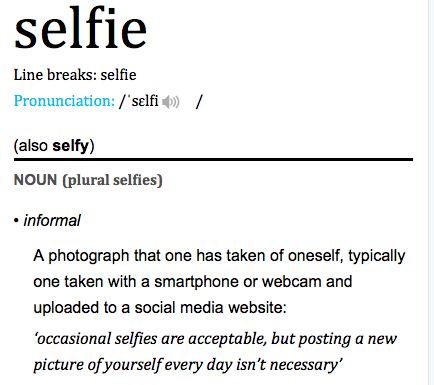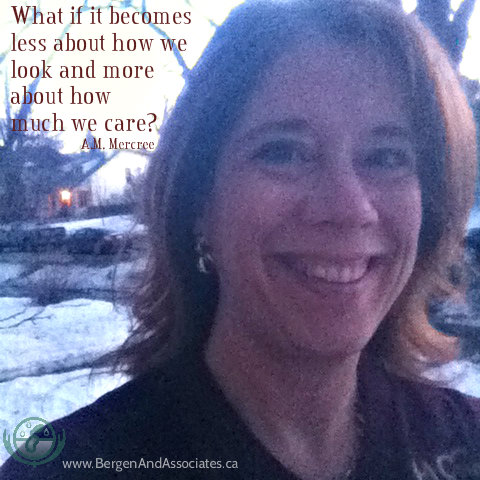Ummm…I hear this word “selfie” does everyone but me know what it means?
Selfies are a relatively recent development, so let me let Oxford tell you:

So…why would anybody take a selfie? Why take pics of yourself to post on social media? What’s the point?
Ahhh…so you’re likely not a “Millennial” if you’re asking that question. No problem. I’ll explain.
A Millennial is a person born between 1982-2004. Millennials understand that in today’s onslaught of endless electronic information where that info is evaluated upon within a few seconds, it is often less about “character” and more about “branding”.
That’s right–branding.
While Baby Boomers and Gen X folks think of Millennials as “narcissistic and self obsessed”, millennials are actually adapting to the current cultural values which we all get sucked into, like it of not. Psychology Today says, “Millennials have no choice but to invest in and develop an online presence. An effective web profile conveys important information about the user’s skills, credibility, and potential.”
Really? You’re telling me “selfies” are normal?
To an extent, they are a natural adaptation to a changing culture. And sometimes, they are even a little fun…my mom sent me a selfie of herself at her first Jet’s game this season…what a hoot! And…just to prove I have a sense of humour on the topic:

But, to be honest, even millennials have noticed some disturbing trends.
Selfies also can serve the purpose of:
- overtly seeking approval for external characteristics. Folks are looking to feel good about themselves on the back of positive feedback with “likes” and “thumbs up” and comments. We all know that to base one’s wellbeing on positive comments of others is dangerous…because when feeling good occurs because of the last good comment–well, that makes the world a very fragile place indeed.
- a focus on self to the exclusion of others. Seriously, branding is a form of advertising…which by it’s nature is very “self focused”…ever seen a commercial where one product is gently caring and empathic for another? Nope. We are wired for connection…to care for each other, to show empathy, to reach out and connect with others meaningfully…and a selfie is pretty much only “self-focused”. It takes us away from being our best selves when we aren’t reaching out to others about who they are and what their stories are.
So, the whole idea of “selfies” can be destructive?
Yep. I mean, posting a selfie of yourself in front of the Eiffel Tower or the Great Wall of China so that your relatives and friends can see you on your travels…well, that’s just necessary in today’s world. You don’t want your mother to cry on the phone the next time you call. These people care about you and they want to see you having incredible experiences because you matter to them.
But the idea of selfies has turned into “How can I create a beautiful me online to impress the socks off others?” or “How beautiful can I make a selfie so that everyone will know how gorgeous I am?” And guess what?
There are apps for that. To remove zits, have your skin glow, brighten your eyes, whiten your teeth.
Skinneepix takes off 5-15 pounds off your selfie to make you look more slender. The developers insist that it is not to be a fat shaming tool, and as entertainment and inspiration…I’m sorry, but I’m just not buying it.
Selfie’s in this culture, ironically, are a huge opportunity for folks to feel lousy about themselves, or as some sort of reaction to how lousy they feel about themselves. An app like Skinneepix says it is designed to help people feel better about who they are if they are defining themselves by how their selfie looks.
In truth, when people use Skinneepix, what they are really telling themselves is that they think they are unacceptably pudgy, and need to resort to being inauthentically themselves to be attractive online.
And that, dear people, is frankly revolting to me. Even folks in the average range sees themselves as unacceptably fat. That is not OK.
What do you mean…in this culture. How does our culture influence this?
Rader Programs, an eating disorder program in the United States has a fantastic page about how our culture influences body image of people (we used to say women, but we know now that men are also powerfully affected).
A few points it makes:
- 97% of women acknowledge they have a “I hate my body” thought at least once a day
- women overestimate the size of their waist by 25% even though they are accurate in estimating the size of a box.
- one study found that 75% of the women in the study evaluated themselves as overweight, even though only 25% were overweight
- 20 years ago, fashion models weighed 8% less than the average woman. Today, the average fashion model weighs 23% less than the average woman.
- Vogue magazine stated that they chose Gisele Bündchen as their “model of the year” as least in part because she isn’t the “typical rail thin image”. Guess what…she weights 115 pounds and is an inch shy of 6 feet. That is 25% below her ideal body weight
Really? It’s that bad? You think our media actually distorts our sense of normalcy, and tells us who we should be? And people buy into it?
So, where can this end up? How bad can it get?
What is the antidote to unhealthy selfie obsession?
Well, the answer is simple, but so not easy.
It’s becoming grounded in what’s real.
- “Branding” may get you an interview, but who you are in the interview is what will get you the job. Your online presence is important (watch the pics of you involving drinking games or other things future employers would frown on) but know that if you set life up so that your worth is determined by your “likes”, you are setting yourself up for a life of perfectionism, anxiety and depression.
- Pretty typically, folks are harder on themselves with regards to appearance than others are. Honestly, if you talk to the people who matter to you, it is completely irrelevant what you look like, but if pushed, your people will describe you as beautiful…because to them, you are.
- It’s developing disciplines that don’t create the bad feelings…cancel the Cosmo subscription, unfriend the friends who are the the “Best Selfie” competition, and keeping trying to suck you into the fray. Be friends with them in real life, but unhook yourself from the “keep up with the Jones’ selfie” thang.






Write a Comment